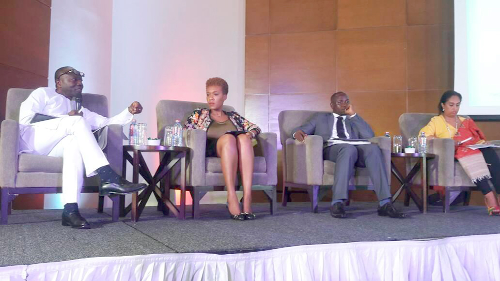
Economy on track, challenge now on sustainability — PwC
Tax and Accounting firm PwC Ghana has indicated that the economy is on track as government’s policies and programmes have led to macroeconomic stability.
It said the major macroeconomic indicators were now trending in the right direction and, therefore, urged the government towards sustaining the gains.
Read Also: PMMC to value gold before export from January 2018.
This was disclosed by the Associate Director of PwC, Mr Abeku Gyan-Quansah, at the post-budget forum which was organised by the firm in Accra.
“Government is on track towards achieving macroeconomic stability; however, sustainability of the gains so far and the implementation of various initiatives remain the challenges,” he stated.
He, therefore, encouraged the government to continue in its efforts in domestic revenue mobilisation by enhancing tax compliance in order to consolidate the gains that have been made in 2017.
He also urged the government to ensure a sustainable debt management system and also increase investments in the agriculture value chains and growth-enhancing infrastructure.
Mr Gyan-Quansah believed this would further help improve and sustain the macroeconomic environment in the country.
Relief to Ghanaians
At the forum, the Minister of Finance, Mr Ken Ofori-Atta, also pointed out that the policies implemented by the government were yielding results and bringing relief to Ghanaians.
“We have turned the economy around and our policies are yielding results and bringing relief to Ghanaians,” he stated.
“We resolved to be fiscally disciplined and respect the limits that Parliament set for us. I am glad to report that we are on course to end the year with the fiscal deficit of 6.3 per cent from 9.4 per cent,” he added.
The minister also highlighted some of the gains that were made in 2017, which included the growth of GDP by 7.8 per cent as against 2.7 per cent in the same period in 2016. It is estimated to grow by 7.9 per cent at end of 2017, up from the original forecast of 6.3 per cent.
Non-oil real GDP also grew at an estimated 4.0 per cent compared to 5.9 per cent in the same period in 2016. Non-oil GDP growth is estimated at 4.8 per cent at the end of 2017.
End-period inflation was 11.6 per cent in October 2017, compared to 15.8 per cent in the same period in 2016.
The overall budget deficit on cash basis was 4.5 per cent of GDP in September 2017 against a target of 4.8 per cent of GDP and an outturn of 6.4 per cent in the same period in 2016.
The primary balance posted a surplus of 0.3 per cent of GDP in September 2017, as targeted, and is a significant improvement over a deficit of 1.6 per cent realised during the same period in 2016.
The current account balance registered a deficit estimated at 0.2 per cent of GDP in August 2017 compared with 2.6 per cent in August 2016; and the country’s Gross International Reserves which stood at US$6.9 billion by the end of September 2017 could cover 3.9 months of imports, compared to the US$4.8 billion or 2.5 months import cover recorded in the same period in 2016.